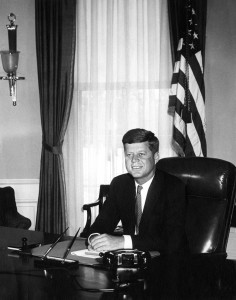It was difficult for me remembering the day JFK was assassinated and hard to believe it was 50 years ago. The question “what if he had lived through that day, would things be different now” still haunts many including me. I found this article in the Inter-American Dialogue that talked about his relationship with Cuba and Colombia and it is quite inspiring.
November 22nd marked the 50th anniversary of the assassination of John F. Kennedy (JFK), the 35th president of the United States. The mood was somber. Many of us recalled that terrible day in Dallas, Texas that produced such grief, revealed the fragility of life, and altered the course of history.
JFK’s legacy, from civil rights to Vietnam, remains a subject of great debate. It is striking how much of his short presidency — just 1000 days — was related to Latin America.
In the early 1960s, in the midst of the Cold War and an intense ideological battle, the Cuban revolution was a top concern for the United States. It was no secret that Washington sought to topple Fidel Castro’s communist regime.
The worst mistake of JFK’s presidency – in fact, one of the greatest fiascos in US history – was the 1961 failed invasion carried out by Cuban refugees of the Bay of Pigs. JFK followed bad advice from the CIA, which assured him the operation would succeed. The president was devastated.
In 1962, JFK’s leadership was severely tested when the Soviet Union installed missiles in Cuba, which was unacceptable for the US. It was the world’s closest brush with nuclear war. In the end, Kennedy was firm, and he reached a peaceful agreement with Soviet leader Nikita Krushchev.
Motivated by an anti-communist crusade and a desire “to eliminate tyranny from a hemisphere in which it has no rightful place,” JFK also launched the Alliance for Progress in 1961. The idea was to promote a reformist, more moderate alternative to revolutionary Cuba throughout Latin America.
In many respects, Colombia, then under the reform-minded government of Alberto Lleras Camargo, became a showcase for JFK’s Latin American policy. His December 1961 visit to Colombia aroused great enthusiasm. That year JFK had started the Peace Corps, a global assistance effort. It is no accident that one of the first groups of volunteers went to Colombia.
Some critics argue that in his Latin American policy, JFK was too extreme in fighting communism. But few deny that JFK left a deep impression on the region’s societies and generated affection. He was a charismatic figure with inspiring rhetoric and, of course, the US’s first (and so far only) Catholic president in a predominantly Catholic continent. He was also the youngest man ever elected to the presidency.
JFK’s last foreign policy speech, delivered in Miami on November 18th 1963 before the Inter-American Press Association, emphasized the spirit of the Alliance for Progress. In Houston, the night before JFK was killed he gave the first speech ever made by a US president to a Latino organization, the League of United Latin American Citizens. Clubs known as “Viva Kennedy” sprung up, which helped cement the ties between the Mexican-American community and the Democratic Party that last to today.
On this anniversary, the conversation quickly turns to JFK’s enormous promise and what might have happened if he had lived. The speculation will continue for another half century and beyond.
But it is unlikely the US will ever have another president as elegant and graceful — and whose life ended so tragically.
